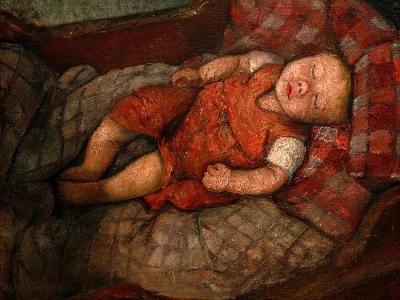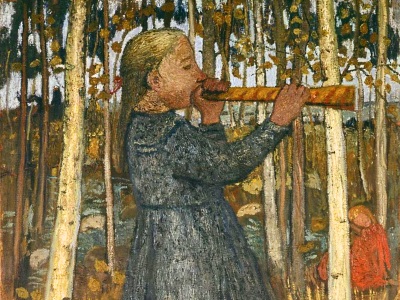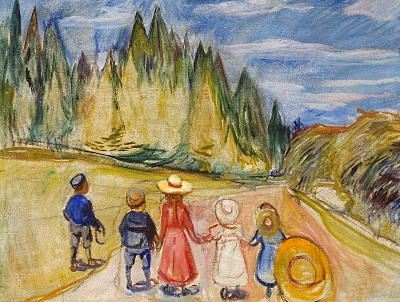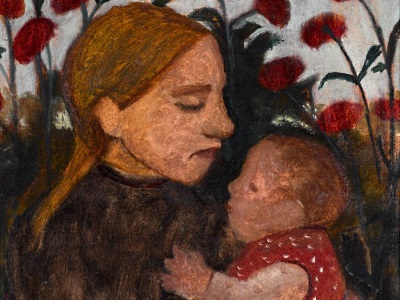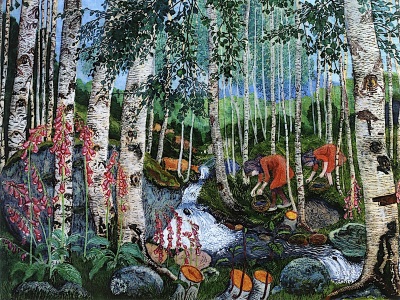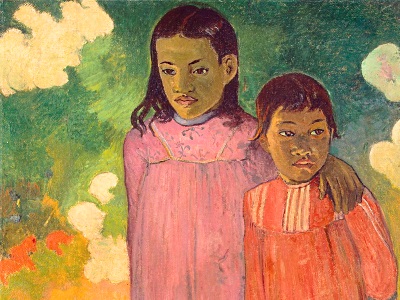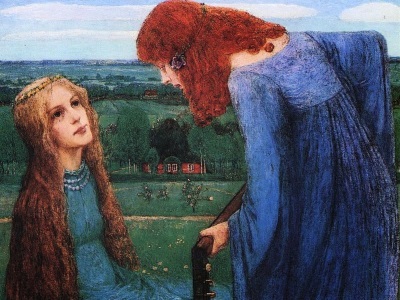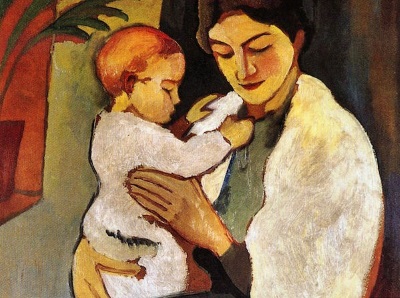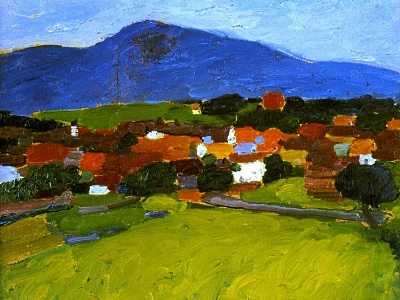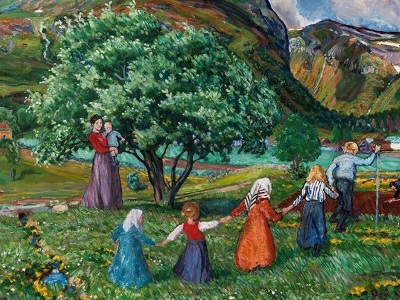Marriage, this is what I call the resolve of two to create a unity which is more than those who created it. I call marriage reverence for one another and for the fulfillment of such a resolve. You should love this land of children, and may this love be your nobility. Faith as the power of truth which clarifies and frees from confusion, is the character of true marriage. Freedom does not demand intoxication or blindness, but power and clarity. Love opens up paradise.
- Eberhard Arnold
Summary
The care and education of children was an integral part of Eberhard Arnold’s ministry and added purpose to the founding of the Bruderhof community. Like the German Youth Movement, he favored arts and crafts, time spent in nature, interdisciplinary studies, and child-led learning.
Caring for homeless children was one of the motives for beginning the Sannerz household community. Eberhard stated that a specific task of the new communal life was “to give children an education and preparation for a life open to the influence of God’s Spirit.”[1] He went out of his way to spend time with the children of the community and to keep up to date on their development, even when it meant postponing other obligations. “We do not want an institution, but a big family,”[2] he said.
In recognition of Jesus’ reverence for the childlike soul and praise of childlike faith, he placed heavy emphasis on serving children, and the educational system he helped devise was interwoven with the fabric of communal life. At first the children were homeschooled, but in 1928, as the community expanded, the Bruderhof received official permission to establish a private school. Even in this more formal setting, education was not confined to the classroom but included hands-on arts and crafts and much time spent in nature.
Eberhard detested threats, compulsion, and manipulation. He shared the revulsion of the Youth Movement to physical or emotional coercion. Force was never an option, though firmness may be required. The teachers have as at least much to learn from the children as the children do from them, he suggested. His approach was based on trust and the drawing out of the best in each child: “Our educational work depends on the faith that the living Christ will arouse from within each person all his or her resolve and capacities for good. All of a child’s best powers are latent inside, waiting to be awakened. True education is achieved only when a fellowship of trust exists between teachers and students. Such an education must take place in community. Not only parents and teachers are to be educators, but the whole lifestyle surrounding the child must act as an educational example of a happy life.”[3]
Eberhard’s insights, while firmly grounded in biblical study, also engaged the ideas of leading educational reformers, among them Blaise Pascal, Friedrich Fröbel, and Johann Heinrich Pestalozzi. Opposed to tiresome repetition, he sought the interrelationship between all school subjects: “Instead of amassing facts and learning them by rote, the underlying sense of coherence between the facts will be shown.”[4] In addition, he insisted that all children, whatever their gifts, should be treated as of equal worth. Manual skills should never be considered inferior to intellectual achievement: “This was of greatest importance for Fröbel, that children learned not only to read and write but also to work with their hands and to value manual work.”[5]
Expectations were made appropriate to the children’s ages. While still small, children were given simple, easily supervised tasks around the house and garden and with the animals. Each could learn to play a musical instrument, or pursue arts and crafts. A workshop was set up exclusively for creative activities with the children. There they could whittle and carve, saw and hammer, and learn wood turnery. The candlesticks, lamps, wooden dolls and animals, lanterns, bookmarks, letter openers, and puzzles the children produced added a small (but not insignificant) contribution to support the communal life.
The Bruderhof school always received exceptional reports from state inspectors, until in November 1933 a Nazi raid resulted in its dissolution. The children were evacuated to Liechtenstein and the school reestablished. Even in dangerous times, the children’s needs remained paramount, and until his death in 1935, Eberhard divided his time between the two communities.
Eberhard repeatedly emphasized that responsibility for children is a holy task. He wrote, “Educational work is a work of worship. It is a matter of reverence for the mystery of the divine, for the likeness to God which is not yet extinguished here.”[6]
1. Eberhard Arnold, “Zum Augenblicklichen Stand der Neuwerksache” (EA 22/04) in Das Neue Werk, 1922.
2. Eberhard Arnold, “Für die Arbeit in der Kindergemeinde Sonnherz in Sannerz” (EA 22/10), 1922.
3. Eberhard Arnold, “Die Kindergemeinde des Alm-Bruderhofs und ihre Erziehung” (EA 224a), 1934.
4. Eberhard Arnold, “Unser Weg zur Erziehung” (EA 27/05), Die Wegwarte, 1927.
5. Eberhard Arnold, Meeting Transcript, January 8, 1933 (EA 45).
6. Eberhard Arnold, “Der Kampf um die Kindheit” (EA 28/05), Die Wegwarte, 1928.
Selected Reading
What is a Child’s True Nature
Eberhard Arnold
“Any educating must be guided by the basic qualities inherent in every child: faith and trust, wonder and reverence, and self-forgetful surrender.” Excerpts from the talks and writings of Eberhard Arnold give insights on the innate qualities of a child and how these can show us what humanity’s true nature should be.
Continue ReadingA Child’s Sympathy for Poverty and Suffering
Eberhard Arnold
“It is not true that children have no feeling for suffering, for the injustice and social guilt of our world…The educator’s task of awakening the child to all humankind accords with a living concern inherent in the child.” Eberhard Arnold discusses the inborn sensitivity of a child toward poverty and suffering.
Continue ReadingWhy We Live in Community
Eberhard Arnold
Everyone’s talking about community these days. In this time-honored manifesto, Eberhard Arnold adds his voice to the vital discussion of what real intentional community is all about: love, joy, unity, and the great “adventure of faith” shared with others along the way.
Quick Quotes
The childlike man does not experience God’s power and greatness without nature. He cannot disregard creation when he stands before the Creator. In the mysterious relationship of the created worlds, the believing creature senses the might of the Creator which gives greatness, life, coherence and unity to all things created.
- Eberhard Arnold
What I want for each young person can be only Christ’s way: to live close to God! To recognize and to do God’s will. To risk your life for the future kingdom of God. To be true to the call which has come to you. To allow your conscience to be more living, awake for the discipleship of Jesus. To temper your character and make the utmost personal effort for the tasks of God’s church. To follow the spirit and mind of Jesus Christ in everything. To trust the entire Gospel. To dedicate your whole life the whole of mankind.
- Eberhard Arnold
